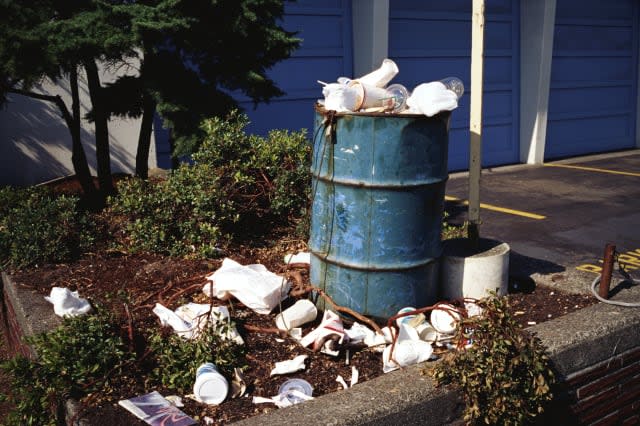Litter fines set to soar to £150

Government is set to massively increase fines for littering, so throwing bread for the ducks or accidentally dropping orange peel in the street could set you back £150.
At the moment, councils are free to set the fines at whatever level they please - and have tended to settle somewhere between £30 and £80. If councils don't set a fine, it defaults to £75. Now, however, the government has decided to up the ante.
The Department for Communities and Local Government has decided that the best way to keep the streets clean is to increase the default fine to £100. If people don't pay up within the deadline, that will increase to £150.
%VIRTUAL-ArticleSidebar-council-stories%
Communities minister Marcus Jones said: "Dropping litter is the kind of anti-social behaviour that really gets people's backs up, and rightly so." "Not only that, litter clearance and disposal costs hundreds of millions of pounds for councils every year – money that could be going on vital services". He added: "'If litter louts can't put their rubbish in the bin perhaps we can hit them in the pocket instead."
Clearly there's a litter problem in the UK. According to Keep Britain Tidy, we drop 30 millions of tons of litter every year in England. Local councils spend around £1 billion cleaning the streets each year, but with budgets under pressure they are looking for an alternative.
Will it work?
On its own, doubling the fines is going to achieve very little. Clearly people don't chuck away a crisp packet in the street thinking: "It could cost me a £50 fine, but it's worth it." They do it because they don't think about the fine at all. Either they think they'll get away with it, or they don't know about it. Doubling, tripling, or even multiplying the fine by ten isn't going to make any difference to them.
There are already people who have ended up paying far more than the original fine because they refused to pay up. In one instance a woman was left with a bill for more than £500 after refusing to pay a fine over a dropped cigarette end. Her case didn't make anyone think twice before stubbing a cigarette out in the street.
There are plenty of councils who enforce the fines through the use of private patrols. They use the fines to pay for the services of the enforcement company - with a useful extra profit on top. Arguably, by increasing the potential profit, this may well encourage more councils to use these private companies, meaning more enforcement, and less litter.
However, this comes with risks of its own. Back in December a woman was fined for throwing a piece of Christmas cake to a squirrel in a churchyard in Kent. The previous month a man in Liscard was fined £60 after his bookmark fell from his book as he walked down the street. In the latter case, the fine was cancelled, but it shows that when a company is incentivised to crackdown as hard as possible in order to make as much money as possible, problems will arise.
The alternatives
The fines aren't the only initiatives in action. There's also the 'Clean for the Queen' campaign - supported by Keep Britain Tidy, Keep Wales Tidy and a number of corporate sponsors. It is asking people to volunteer to help clear their streets and local countryside of litter between March 4th and 6th, in time for the Queen's 90th birthday.
Doubtless this will encourage community-minded people to pick up a bin bag and get stuck in. There will be thousands of volunteers picking up litter across the country. But you have to ask whether the solution really lies in asking people who have never dropped a piece of litter in their lives to clean up after selfish people who cannot be bothered to use a bin.
On a more practical level, some councils are using smart bins, which have a built-in crusher so they contain more rubbish, and have sensors which text the council when they are full - so they can be emptied. Others have introduced gum targets to persuade people to stick their gum on a target rather than spit it into the street.
But what do you think? Is there a better solution? Let us know in the comments.





